Hunting for Knowledge
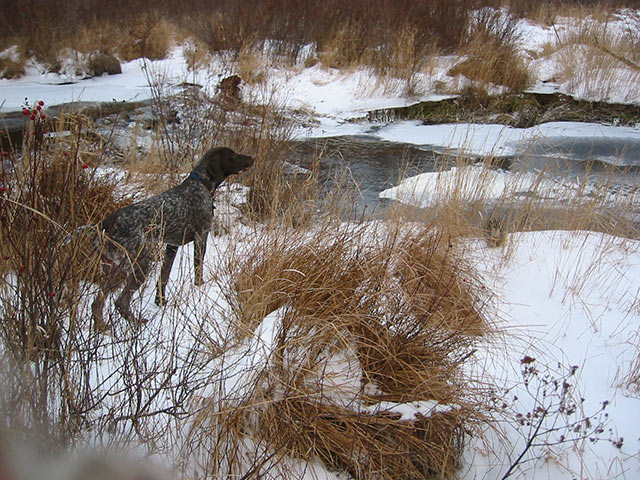
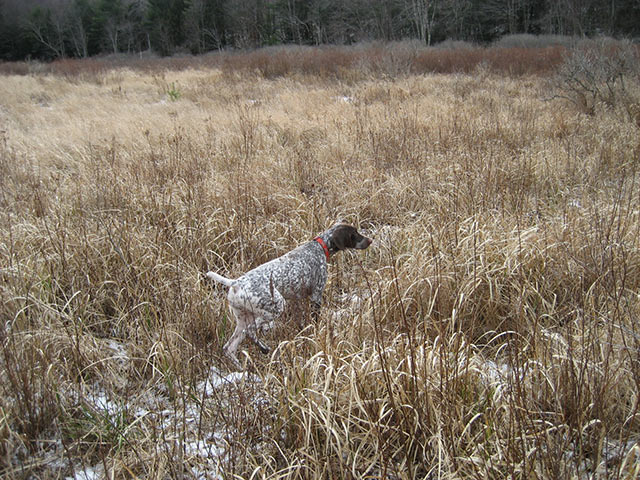
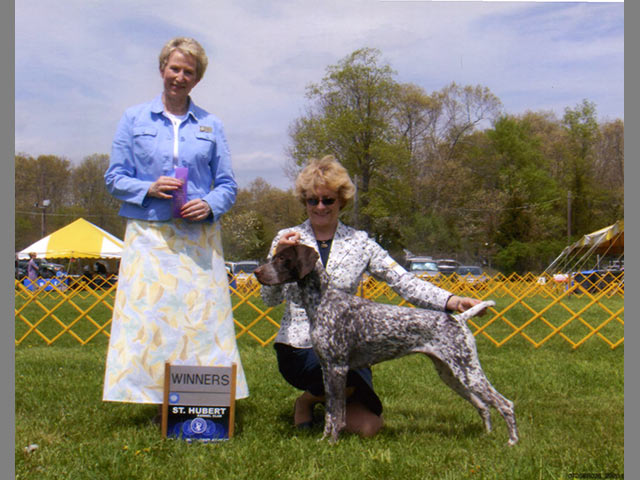
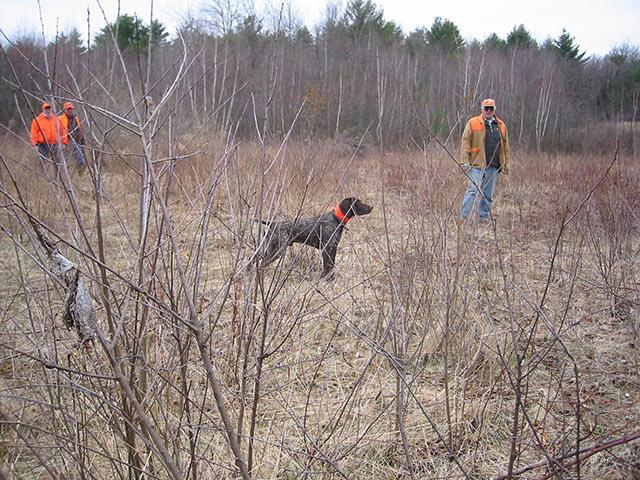
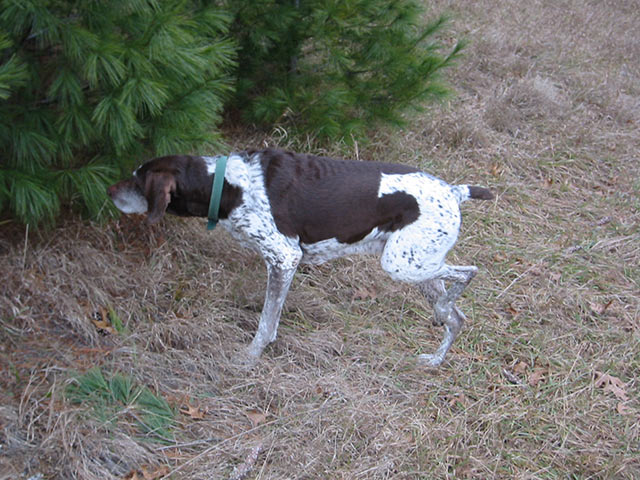
McMillan-Zwirko tells her 27-year story in chapters named for the dogs she has owned.
Ramsay
In 1981, McMillan-Zwirko's fiancée, Jan, wanted a puppy for his birthday. Following the advice to give gifts you would like to receive, she gave him Ramsay.
"He'd go out hunting with Ramsay, and I'd watch. Ramsay was calm and methodical. He'd go back and forth carefully in the field."
Ramsay offered McMillan-Zwirko a glimpse into the depth of human-dog connections. In those early outings, she felt exhilarated. "Nothing is more exciting than seeing that light go off – your dog recognizes a bird and knows he's hunting."
Gretsie
For five years, Ramsay fascinated McMillan-Zwirko, sparking her interest in the breed. In 1986, she heard about a German Shorthaired Pointer available through rescue. She adopted the dog, naming her Gretsie.
Seeing Gretsie and Ramsay hunt together, McMillan-Zwirko observed clear personality differences. "Ramsay would hang back. But Gretsie had no fear and would just run."
McMillan learned this suddenly. After Gretsie's spaying, McMillan-Zwirko and Jan were scouting for hunting spots. "Out of nowhere, a pheasant flew up. Gretsie jumped through the open truck window to chase the bird. She still had her stitches from surgery! Right there, Gretsie taught us about drive and desire."
Mandy and Feather
McMillan-Zwirko was getting better at hunting, although still rarely taking a gun into the field. In 1989, with Ramsay and Gretsie in their geriatric years, McMillan-Zwirko sought a dog with good energy who was also trainable. She found it in Mandy.
After eight years working with German Shorthaired Pointers, McMillan-Zwirko decided to breed her first litter. In 1991, Mandy whelped 11 puppies. McMillan-Zwirko kept Feather, a male.
Around the time Mandy had her litter, and as McMillan-Zwirko began working with Feather, she had her first dog show experience. "This opened my eyes to what we could do, other than hunting." McMillan-Zwirko spoke with people about conformation, hunt tests, field trials, and other events. "I came home and told Jan, 'you hunt with them. I want to start doing more'."
Although Feather did not win many ribbons, he helped McMillan-Zwirko see how exciting it is to work in the ring. She realized that skills needed in the ring were similar to those for hunting. "Feather was so dependable in the water. If a bird went down, he was right there to get it. He stayed with me. In the ring, he listened to everything I told him and was always by my side."
Nellie
After the deaths of Gretsie and Ramsay in 1993 and 1994, with thoughts of Feather's conformation experiences, McMillan-Zwirko wanted to succeed in the ring. In 1995, she saw a litter. A female caught her attention. This was Nellie, her next great adventure.
Oddly, Nellie, bred for conformation, initially had little energy for the sport. "She worked with me, and earned seven points, but she wasn't comfortable."
McMillan-Zwirko brought Nellie to hunt trials, and was pleasantly surprised. "For a long time, she had no interest in quail. Then one day she pointed one out. It was as if she suddenly said, 'See, I can do it!' She competed, and got a leg on her hunting title."
The sport-switching Nellie gave McMillan-Zwirko the urge to find more multi-skilled dogs.
Barron
In the mid-1990s, McMillan-Zwirko became involved in rescue. One day in 1995, she learned about a Shorthair in terrible shape. He turned out to be a dog from Mandy's 1991 litter.
"The buyer passed Barron to someone else, who gave him as a gift to his girlfriend." McMillan-Zwirko vividly recalls Barron's condition. "He wasn't fed, so he only weighed 49 pounds and his tail was too thin. He had heartworm. No vaccinations. He had been abused. If we made swift hand motions, he'd cringe."
Over the next six months, McMillan-Zwirko got Barron to full health. She then took him into the field, where he shed his fears. "He was an excellent hunter. When he found a bird, he never broke his point. He wouldn't run or chase the bird."
McMillan-Zwirko had never seen this kind of focus.
Because he was so steady, McMillan-Zwirko gave Barron a chance in the show ring. This rescued dog, bred for hunting, was a natural. "He didn't show until five years of age, but he did so well."
Barron's show career abruptly ended when he needed a mass cell tumor removed from his chest at eight years of age. He lived to be 17.
Topper
In 2003, when McMillan-Zwirko went to see a friend's litter, something stirred in her. She believed she had found her breakthrough dog. "Just a day old, but I took a look at one and wanted him."
As a hopeful sign, she named him Topper.
All her experiences with so many different dog personalities seemed to come together. "Topper was my first conformation champion. He finished in 2005, at just two years old."
Topper was also winning hunt trials. And while he was at it, McMillan-Zwirko competed with him in Rally, earning a title in 2007.
McMillan-Zwirko currently competes in the ring, the field, and rally with Topper and two other dogs – Chance and Libby. She is also more involved in rescue work, and recently became a hunt test judge.
Connections
McMillan-Zwirko has owned dogs meant to be hunters who ended up better in the ring, and show dogs who proved more apt in the field. She has learned lessons from this. "First, keep your sense of humor. Without that, you're nowhere with dogs."
It is great to have goals as an owner, but McMillan-Zwirko suggests giving each dog individual attention. "Take your dogs out one at a time to see each one's personality and aptitude. Otherwise, some dogs overpower the others. Some dogs aren't bold enough until you work with them alone."
After seeing what each individual dog possesses, the owner must hone it. "Every one of my dogs is so different. All dogs have abilities – and issues! Find their best. Focus on that, without accidentally bringing out their worst."
